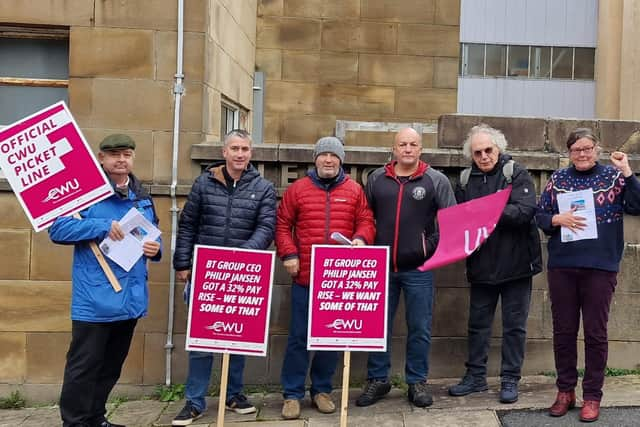BT and Openreach workers in Lancaster join nationwide strike action
and live on Freeview channel 276
A picket line is in place outside the old telephone exchange in Cawthorne Street as part of the strike.
The dispute, which involves more than 40,000 CWU members working for BT and Openreach, was triggered by what the union says is “BT’s unilateral imposition of real-terms pay cuts for all CWU-represented grades”.
Advertisement
Hide AdAdvertisement
Hide AdCWU have also announced a withdrawal of all emergency cover, including 999 operators, workers who support the emergency line and Relay UK, citing greater leverage in the dispute by putting more pressure on those at the top.


In a statement, the union said: "BT Group’s approach to the annual pay review this year represents a radical departure by management from the time-honoured partnership approach to industrial relations that had previously underpinned 35 years of industrial peace in BT Group.
"Instead of following normal negotiating protocols – under which a draft deal that is fair and acceptable to both sides is arrived at through discussions, and then recommended by the union to its membership for their ratification – this year BT abruptly terminated the talks after just six short meetings. Firm proposals had only been tabled by management in the latter two of those meetings.
"BT claims the flat-rate settlement of £1,500 that it then imposed, without agreement, equates to between 3.8% and 8% dependent on where individuals sit on the pay scale – though in actuality the higher percentage going to the company’s lowest paid workers is illusory.
Advertisement
Hide AdAdvertisement
Hide Ad"That is because up to two thirds of the £1,500 uplift had previously been paid out to address a recruitment and retention crisis in the company’s call centres where new hires had been placed on unagreed pay rates that were only marginally over the Real Living Wage.
"The CWU therefore calculates that even the biggest beneficiaries of this year’s imposed flat rate pay award have only received around 5% – with the vast majority of CWU-represented grades receiving only a little over 4% and some below 3%.
"That compares with spiralling inflation that saw the Government’s preferred (typically lower) consumer price inflation (CPI) measure hit 10.1% in July (RPI 12.3%) and even the Bank of England predicting CPI will top 13% within months.
"In 2021 members received no consolidated pay rise at all, and even the agreed settlement in 2020 was slightly below inflation. In fact, since 2020, BT pay for CWU grades has increased by just 6.6% (including the £1,500 imposed award for 2022).
Advertisement
Hide AdAdvertisement
Hide Ad"Without any improvement to the imposed £1,500 award, this represents a real-terms pay cut since 2020 of 6.9% based on RPI, and 2.8% based on CPI.
"This is despite BT’s declaration of a £1.3bn annual profit, a £761m dividend payout for shareholders and a 32% pay increase for the CEO.”
The CWU conducted its first company-wide industrial action ballot in BT Group since 1987 in June. In Openreach, where 28,425 CWU members were entitled to vote, participants recorded a 95.8% ‘yes’ vote for industrial action on a 74.8% turnout. In BT, where 10,353 were issued with ballot papers, another ‘yes’ vote of 91.5% was recorded on a 58.2% turnout.
The union said: "CWU hopes that such an overwhelming demonstration of workforce anger would persuade management back to the negotiating table were, however, met with BT categorically refusing to re-open 2022 pay negotiations."
CWU workers will also strike on October 10, 20 and 24.